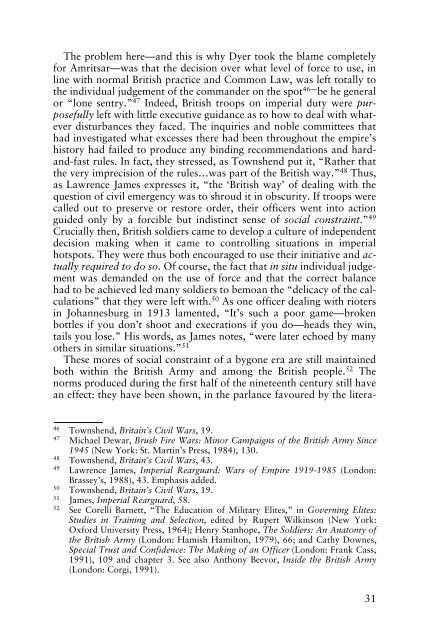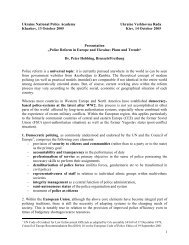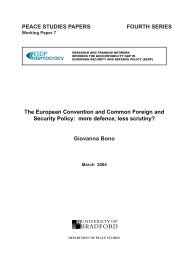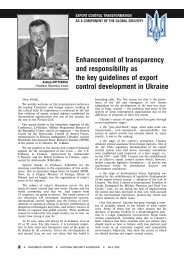combating terrorism and its implications for the security sector - DCAF
combating terrorism and its implications for the security sector - DCAF
combating terrorism and its implications for the security sector - DCAF
You also want an ePaper? Increase the reach of your titles
YUMPU automatically turns print PDFs into web optimized ePapers that Google loves.
The problem here—<strong>and</strong> this is why Dyer took <strong>the</strong> blame completely<br />
<strong>for</strong> Amr<strong>its</strong>ar—was that <strong>the</strong> decision over what level of <strong>for</strong>ce to use, in<br />
line with normal British practice <strong>and</strong> Common Law, was left totally to<br />
<strong>the</strong> individual judgement of <strong>the</strong> comm<strong>and</strong>er on <strong>the</strong> spot 46— be he general<br />
or “lone sentry.” 47 Indeed, British troops on imperial duty were purposefully<br />
left with little executive guidance as to how to deal with whatever<br />
disturbances <strong>the</strong>y faced. The inquiries <strong>and</strong> noble committees that<br />
had investigated what excesses <strong>the</strong>re had been throughout <strong>the</strong> empire’s<br />
history had failed to produce any binding recommendations <strong>and</strong> hard<strong>and</strong>-fast<br />
rules. In fact, <strong>the</strong>y stressed, as Townshend put it, “Ra<strong>the</strong>r that<br />
<strong>the</strong> very imprecision of <strong>the</strong> rules…was part of <strong>the</strong> British way.” 48 Thus,<br />
as Lawrence James expresses it, “<strong>the</strong> ‘British way’ of dealing with <strong>the</strong><br />
question of civil emergency was to shroud it in obscurity. If troops were<br />
called out to preserve or restore order, <strong>the</strong>ir officers went into action<br />
guided only by a <strong>for</strong>cible but indistinct sense of social constraint.” 49<br />
Crucially <strong>the</strong>n, British soldiers came to develop a culture of independent<br />
decision making when it came to controlling situations in imperial<br />
hotspots. They were thus both encouraged to use <strong>the</strong>ir initiative <strong>and</strong> actually<br />
required to do so. Of course, <strong>the</strong> fact that in situ individual judgement<br />
was dem<strong>and</strong>ed on <strong>the</strong> use of <strong>for</strong>ce <strong>and</strong> that <strong>the</strong> correct balance<br />
had to be achieved led many soldiers to bemoan <strong>the</strong> “delicacy of <strong>the</strong> calculations”<br />
that <strong>the</strong>y were left with. 50 As one officer dealing with rioters<br />
in Johannesburg in 1913 lamented, “It’s such a poor game—broken<br />
bottles if you don’t shoot <strong>and</strong> execrations if you do—heads <strong>the</strong>y win,<br />
tails you lose.” His words, as James notes, “were later echoed by many<br />
o<strong>the</strong>rs in similar situations.” 51<br />
These mores of social constraint of a bygone era are still maintained<br />
both within <strong>the</strong> British Army <strong>and</strong> among <strong>the</strong> British people. 52 The<br />
norms produced during <strong>the</strong> first half of <strong>the</strong> nineteenth century still have<br />
an effect: <strong>the</strong>y have been shown, in <strong>the</strong> parlance favoured by <strong>the</strong> litera-<br />
46 Townshend, Britain’s Civil Wars, 19.<br />
47 Michael Dewar, Brush Fire Wars: Minor Campaigns of <strong>the</strong> British Army Since<br />
1945 (New York: St. Martin’s Press, 1984), 130.<br />
48 Townshend, Britain’s Civil Wars, 43.<br />
49 Lawrence James, Imperial Rearguard: Wars of Empire 1919-1985 (London:<br />
Brassey’s, 1988), 43. Emphasis added.<br />
50 Townshend, Britain’s Civil Wars, 19.<br />
51 James, Imperial Rearguard, 58.<br />
52 See Corelli Barnett, “The Education of Military Elites,” in Governing Elites:<br />
Studies in Training <strong>and</strong> Selection, edited by Rupert Wilkinson (New York:<br />
Ox<strong>for</strong>d University Press, 1964); Henry Stanhope, The Soldiers: An Anatomy of<br />
<strong>the</strong> British Army (London: Hamish Hamilton, 1979), 66; <strong>and</strong> Cathy Downes,<br />
Special Trust <strong>and</strong> Confidence: The Making of an Officer (London: Frank Cass,<br />
1991), 109 <strong>and</strong> chapter 3. See also Anthony Beevor, Inside <strong>the</strong> British Army<br />
(London: Corgi, 1991).<br />
31

















